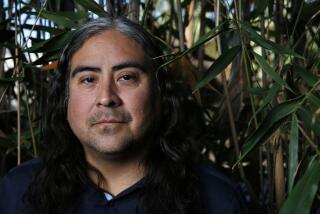WEST COAST PREMIERES : ORGANIST PAYNE PLAYS BACH CHORALE-PRELUDES
- Share via
One-hundred thirty-two years after Lowell Mason brought the manuscripts to the United States, and eventually left them to the Yale School of Music, a set of 33 chorale-preludes written by J. S. Bach between 1702 and 1710 were rediscovered and authenticated in December, 1984.
Sunday afternoon, 10 pieces in the set formed the focus of interest in a Baroque program played by Joseph Payne on the new Fisk organ at the Parish of St. Matthew in Pacific Palisades.
Though these brief works made up the centerpiece of the fascinating agenda, they did not, however, necessarily provide its real substance.
This set of chorale-preludes is, after all, the handiwork of a young--between 17 and 25 years old--Bach. In their exuberance and colorfulness, the pieces heard Sunday display, in the words of Payne’s informative program notes, “the workings of a youthful genius.”
Nevertheless--and heard in the context of contemporaneous works by Bach himself, by two of his antecedents (the brothers, Johann Christoph and Johann Michael Bach) and by Johann Pachelbel and Johann Ludwig Krebs--the chorale-preludes hold their own through the ingenuity of their experimentation and through their textual insights.
(Karl Geiringer’s analysis of the rediscovered pieces, and reviews of the first two recordings issued recently--Payne’s is one of them--is scheduled to appear in the Oct. 20 Calendar.)
Payne’s appearance, inaugurating a new season of Chamber Music in Historic Sites, showed off both the asymmetrical and woody visual pleasures of St. Matthew’s (1982), with its spacious, airy interior and rustic exterior, and the versatility and pristine sound-palette of the Pardee Memorial Organ, completed earlier this year by C. B. Fisk Inc. of Gloucester, Mass.
J. Christoph Bach’s joyful Praeludium and Fugue in E-flat and Pachelbel’s similarly unclouded Toccata in E minor began the proceedings tidily. From there on, the program unfolded without recourse to grumpiness or pessimism.
At its joints, this agenda indicated the range of Bach’s musical horizons in his Weimar years (1708-17). In the Fantasy and Fugue in A minor, the Pastorale in F and the Passacaglia and Fugue in C minor, works of what has been called his second creative period, an integration of Northern and Southern influences is clearly taking place, the composer’s stylistic education now completed.
A certain roughness marked all of Payne’s otherwise authoritative performances. While the British-born, Boston-based organist achieved clear articulation and tempo-continence some of the time, in other moments he showed less control. Endings arrived abruptly; some tempos emerged less than settled; tentativeness marred certain cadences.
Even so, a large and stylish audience crowded the neighborhood church well beyond its stated capacity of 350 of the faithful and heard this program with rapt attentiveness.
More to Read
The biggest entertainment stories
Get our big stories about Hollywood, film, television, music, arts, culture and more right in your inbox as soon as they publish.
You may occasionally receive promotional content from the Los Angeles Times.










